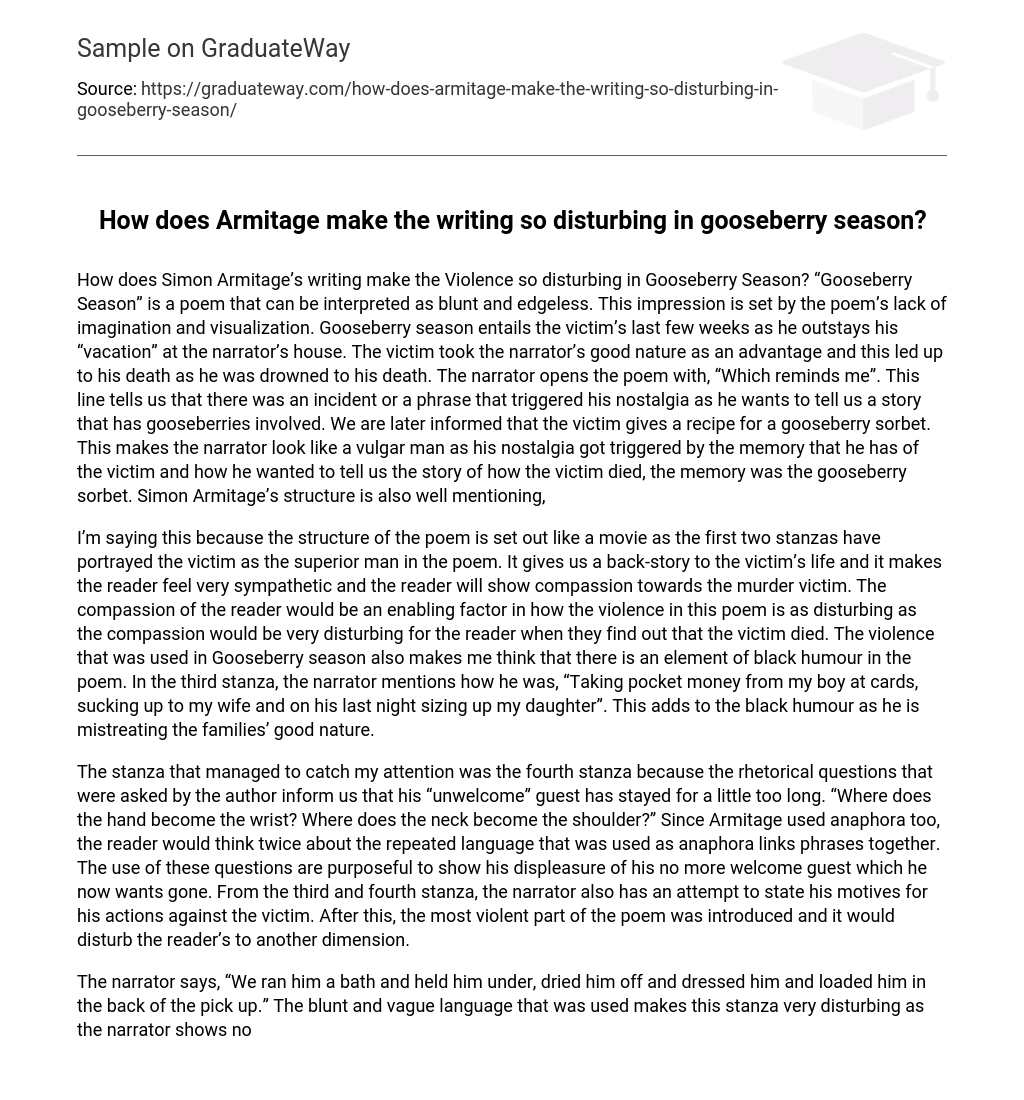How does Simon Armitage’s writing make the Violence so disturbing in Gooseberry Season? “Gooseberry Season” is a poem that can be interpreted as blunt and edgeless. This impression is set by the poem’s lack of imagination and visualization. Gooseberry season entails the victim’s last few weeks as he outstays his “vacation” at the narrator’s house. The victim took the narrator’s good nature as an advantage and this led up to his death as he was drowned to his death. The narrator opens the poem with, “Which reminds me”. This line tells us that there was an incident or a phrase that triggered his nostalgia as he wants to tell us a story that has gooseberries involved. We are later informed that the victim gives a recipe for a gooseberry sorbet. This makes the narrator look like a vulgar man as his nostalgia got triggered by the memory that he has of the victim and how he wanted to tell us the story of how the victim died, the memory was the gooseberry sorbet. Simon Armitage’s structure is also well mentioning,
I’m saying this because the structure of the poem is set out like a movie as the first two stanzas have portrayed the victim as the superior man in the poem. It gives us a back-story to the victim’s life and it makes the reader feel very sympathetic and the reader will show compassion towards the murder victim. The compassion of the reader would be an enabling factor in how the violence in this poem is as disturbing as the compassion would be very disturbing for the reader when they find out that the victim died. The violence that was used in Gooseberry season also makes me think that there is an element of black humour in the poem. In the third stanza, the narrator mentions how he was, “Taking pocket money from my boy at cards, sucking up to my wife and on his last night sizing up my daughter”. This adds to the black humour as he is mistreating the families’ good nature.
The stanza that managed to catch my attention was the fourth stanza because the rhetorical questions that were asked by the author inform us that his “unwelcome” guest has stayed for a little too long. “Where does the hand become the wrist? Where does the neck become the shoulder?” Since Armitage used anaphora too, the reader would think twice about the repeated language that was used as anaphora links phrases together. The use of these questions are purposeful to show his displeasure of his no more welcome guest which he now wants gone. From the third and fourth stanza, the narrator also has an attempt to state his motives for his actions against the victim. After this, the most violent part of the poem was introduced and it would disturb the reader’s to another dimension.
The narrator says, “We ran him a bath and held him under, dried him off and dressed him and loaded him in the back of the pick up.” The blunt and vague language that was used makes this stanza very disturbing as the narrator shows no remorse or compassion towards the victim and makes him look like a barbaric animal. In my personal opinion was the most disturbing part because the narrator didn’t have the will to give the victim the chance to leave or apologise for his actions. The narrator immorally kills the victim and this was the most disturbing part because he killed a man for no good reason. Another powerful, disturbing piece in the poem comes in the penultimate stanza. The narrator says, “After my boy had been through his pockets we dragged him like a mattress”. This was an imaginative simile and it was very powerful too, the narrator compares the victim’s body to a mattress. When Armitage used this, it makes us think how the narrator is a unsympathetic, insensitive man as he “dragged him like a mattress”.
When using the word “mattress”, it creeps the reader as it is rare that you see a human being compared to a piece of furniture. This also adds to the black humour of the poem. Also, the fact that the narrator used his son to help him kill a human being sends shivers down readers’ spines. Immoral to retrieve help from your son as fathers are meant to be role models to their sons. Finally, the narrator “threw him over the border” which again shows his cold-heart as he shows no respect to the victim at all. The narrator uses the wrong doings of the victim and he immorally killed him because of his actions, from this poem, Armitage uses deception and unemotional feelings through a heartless, cold man who “scoops the sorbet into five equal portions”. BY:
Yogithan Shanmuganathan 10H





